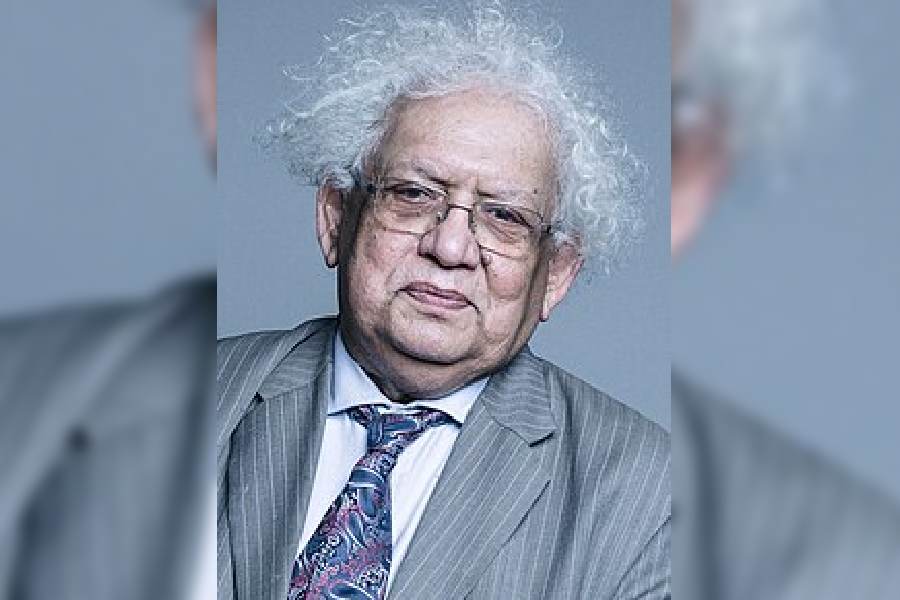Amid the ongoing debate on the looming delimitation, Indian-origin economist, author and former Labour politician Lord Meghnad Desai on Friday said constraints should not be put in place before negotiations start and a "great democracy" like India can resolve the issue.
Speaking at the launch of a book, "Demography Representation Delimitation", written by Ravi K. Mishra, Desai described India as a "multinational nation".
"It's a collection of many nations. Every linguistic state thinks of itself as a nation. And we are putting together a civilisation. So you have to respect the dignity of every nation and its right of being part of the Indian Union," he said.
"And therefore, my feeling is, don't put constraints on the solution before you start negotiating with people. Don't start by saying, well, we have 545 seats now, but we can't have more than 700 seats... those virtuous ones who limited their population will be punished and those bad ones who did not will be rewarded. None of that," he said.
"This problem has been postponed for far too long," he added, referring to the pending delimitation exercise, which is at present under freeze until the first Census is conducted after 2026.
"This is a prosperous country, it's a successful democracy and it is going to be a developed country. So there is absolutely no reason to say, oh we are poor and we can't afford this," Desai said.
He also dismissed the notion that population growth was a problem.
"There was a time when people said, oh if we have too many children, we will be destitute. Now we have a demographic dividend.
"Children are an asset, they are not a liability. So I think India should stop worrying about constraints which have been imposed in the past, which are utterly irrelevant," he said.
On the delimitation exercise, Desai said certain criteria can be fixed, like no state will get fewer seats than what it already has.
He said there is no reason why the Lok Sabha cannot have 900 members.
"But I think what people must do is make quite sure that no state -- east, west, north, south -- feels deprived at the end of this thing. Because they say, oh, but this amendment was passed in 1981 and that amendment is so, so important that we can't change the amendment," he said.
"We can solve the problem and we only need patience and goodwill for each other," he added.
BJP leader Swapan Dasgupta said the issue of delimitation has been "politicised".
He questioned if the fears were real or based on a certain prejudice "because you do not like a particular dispensation which is empowered at the Centre, you automatically assume that they are Hindi-speaking vegetarians".
"And that translated into this would make it... (that the) south is going to be discriminated against," he said.
Author and political commentator Neerja Chowdhury said the issue has agitated the southern states much more and has led to leaders like Tamil Nadu Chief Minister MK Stalin and Andhra Pradesh Chief Minister N Chandrababu Naidu asking people to have more children.
She said the issue needed to be handled with care.
"Fault lines have emerged much more in the recent months and will have to be handled with wisdom and care so that it does not arouse passions, either around language or around north-south geographic divide, or caste lines, because it also involves the continuation of reservation for groups, which constituency will be reserved and not reserved," she added.
Author Mishra said the population of the southern states had seen a peak in the first half of the last century while the population growth in the northern states peaked later.
"When family planning assumed importance in the late 1960s, under the influence of the flawed Western notion of population explosion in the Third World, most southern states had already grown rapidly for 90 years and were on the verge of exiting the peak phase of their demographic transition.
"A gradual decline in fertility and growth thereafter was inevitable, even though till 1991 their growth remained close to 20 per cent. I am referring to decadal growth," Mishra said.
"It was only around then that the north entered the peak growth phase, meaning in the 1950s and 60s, which was bound therefore to last for a few decades. These facts have been largely overlooked in the political debates on the subject," he added.
According to Mishra, the average Lok Sabha constituency in the south has just about 21 lakh people, the north approximately 31 lakh people and the west 28 lakh.
"While the divide in representation is generally taught in terms of north versus south, my study indicates that mainly because of the south's earlier spurt in population growth starting in the late 19th century, it is more like the south versus the rest," he said.
Except for the headline, this story has not been edited by The Telegraph Online staff and has been published from a syndicated feed.










